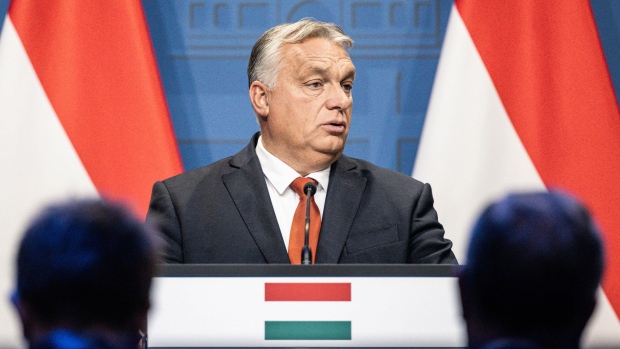Oct 19, 2022
Orban’s Political High-Wire Act Pushes Hungary to the Brink
, Bloomberg News

(Bloomberg) -- As European Union heads of government gather to discuss the war in Ukraine, energy security and the economy, one increasingly desperate leader will have his own agenda again.
Hungarian Prime Minister Viktor Orban has been in open conflict with the rest of the bloc after trying to derail sanctions against Russia, the latest episode in a protracted standoff between Budapest and Brussels over how he runs his country. Last month, the European Parliament said Hungary could no longer be considered a full democracy.
But with a plunging currency and fragile finances, Orban’s high-wire act of reconciling his courtship of Vladimir Putin with the immediate task of unlocking billions of euros in EU funds is becoming more perilous. While investors have focused on the turmoil in post-Brexit UK in recent weeks, Hungary is turning into a more extreme cautionary tale of what happens when a political project becomes disconnected from economic reality.
“Hungary is badly in need of EU funds,” said Andras Simor, a former central bank governor who helped steer Hungary through the financial crisis when it required a bailout led by the International Monetary Fund. “But even more than the actual money, Hungary needs the EU’s seal of approval to shore up its battered credibility.”
The forint has dropped more than 12% against the euro since Russia invaded Ukraine in February, despite Hungary having by far the EU’s highest interest rates. Only the currencies of Argentina and Turkey have fared worse in emerging markets. That, in turn, raised the cost of energy imports primarily from Russia and pushed inflation above 20%.
Rallying Cry
The Hungarian currency was hitting successive record lows again last week, prompting Orban to call on his political allies to come up with a fix. In his latest weekly radio address on Friday, he asked his finance minister and central bank governor to bring inflation under control. Within hours, policy makers hiked the effective base rate to 18% from 13% as part of a package of emergency measures.
The move has steadied the forint -- for now. “We don’t see this as a game changer,” said Marek Drimal, a strategist at Societe Generale in London.
Investors instead point to more than 40 billion euros ($39 billion) in fresh EU funds as the solution. Besides a much needed infusion of foreign currency, an agreement with the bloc would also shore up Hungary’s standing in the West after its lukewarm support for Ukraine, harsh criticism of western policy and side deals with Russian energy giant Gazprom PJSC.
The EU’s executive has effectively blocked financing over concerns about widespread graft under Orban’s 12-year rule. During that time, he assembled what he refers to as an “illiberal democracy,” extending his influence over everything from the media and courts to schools.
The project, which made Orban a ringleader for populists and a favorite of Donald Trump, is now at risk of coming apart without the EU money that underpinned Hungary’s economic expansion and its prime minister’s pre-election largesse.
EU Bankrolled Eastern Rebellion That Threatens to Tear It Apart
Tens of thousands protested this month against low wages for teachers, a relatively unusual display of discontent in Hungary. Orban says he can’t raise them without EU funds. Lavish utility subsidies, the bulwark of his political support for more than a decade, have also been cut.
Orban’s Crisis
Last month, the European Commission proposed suspending access to 7.5 billion euros of Hungary’s EU funding due to corruption concerns, an extreme step against a member state. Another 5.8 billion euros in pandemic-recovery funds also awaits approval.
Hungary has received an extra two months -- until Dec. 19 -- to make good on pledges to approve and implement anti-corruption legislation. Orban may also have to bolster judicial independence after extending his influence over the courts.
While the government in Budapest has said it will do what it takes to secure funding, it also started a campaign pinning Hungary’s malaise on the EU. It includes billboards with the word “sanctions” written on a bomb and the caption: “Brussels sanctions are destroying us!”
“This is Orban’s greatest crisis,” said Gabor Gyori, a political analyst at Policy Solutions in Budapest. “It’s unclear how long people will believe his false narrative that the EU is to blame for Hungary’s economic troubles.”
Support for his Fidesz party, meanwhile, is declining just months after Orban’s fourth consecutive landslide election victory. The party has decided against holding a traditional street rally in Budapest on Sunday on the anniversary of the 1956 anti-Soviet revolt.
Orban’s priority, instead, will be to corral support in Brussels, where EU leaders start two days of meetings on Thursday.
But a broader question lingers around EU capitals about which side Orban is really on -- and where that one day might lead.
This week, as Russia fired rockets into downtown Kyiv, Hungary was alone is abstaining from an EU initiative to train Ukrainian soldiers. Its foreign minister also said it may block further EU aid to Ukraine for weapons.
The main worry is that a failure to agree on EU funds may push Hungary to a “point of no return,” a potential EU exit, Czech European Affairs Minister Mikulas Bek told RTL Klub television in Hungary. That doesn’t mean Hungary will be let off the hook, he said.
“It’s a decisive moment,” said Bek, whose country holds the rotating EU presidency. “There is a risk if we don’t find a way to settle the issue, it could lead to a very negative trajectory.”
©2022 Bloomberg L.P.








